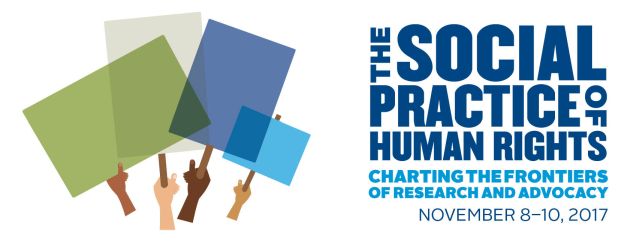
Start Date
11-8-2017 3:30 PM
Keywords
Human Rights Cities, Human Rights, Human Rights Education, Community Engagement
Abstract
In 1948, the United Nations adopted the Universal Declaration of Human Rights (UDHR) as a common standard of achievement and called upon every individual and organ of society to promote the rights enshrined in the document. The UDHR has been applied in many ways around the world, including by the international Human Rights Cities movement, which began in Rosario, Argentina, in 1997.
Today more than two dozen Human Rights Cities have formed around the globe, including at least nine in the United States (Washington, DC; Eugene, OR; Pittsburgh, PA; Chapel Hill, NC; Columbus, IN; Jackson, MI; Seattle, WA; Mountain View, CA; and Boston, MA). Human Rights Cities are community-based initiatives in which people learn about their human rights and how to use human rights frameworks to advance social justice in their communities.
While locally created and directed, Human Rights Cities are also linked to an international network of cities working to advance social justice and sustainable development based upon the UDHR.
In 2011, the Boston City Council proclaimed Boston a Human Rights City. To date, no published research has examined the impact, if any, of this proclamation. In this light, this research project has two main purposes:
(1) To map perceptions of academic faculty of an urban public university and various community-based organizations regarding their familiarity with and use of human rights frameworks since Boston became a Human Rights City.
(2) To form relationships for co-creating knowledge and action between researchers and activists through human rights-based approaches on a range of interconnected political, economic, and social issues that are affecting the communities of Boston.
In this presentation, the researchers present the history of the Boston Human Rights City movement as well as preliminary findings on the impacts of the resolution based on interviews with academics and leaders of community-based organizations.
Included in
Civic and Community Engagement Commons, Community-Based Learning Commons, Humane Education Commons, Human Rights Law Commons, Law and Society Commons, Other Education Commons, Politics and Social Change Commons
Where Do We Go from Here? Charting Perceptions of the Impact of the Human Rights City Boston Resolution
In 1948, the United Nations adopted the Universal Declaration of Human Rights (UDHR) as a common standard of achievement and called upon every individual and organ of society to promote the rights enshrined in the document. The UDHR has been applied in many ways around the world, including by the international Human Rights Cities movement, which began in Rosario, Argentina, in 1997.
Today more than two dozen Human Rights Cities have formed around the globe, including at least nine in the United States (Washington, DC; Eugene, OR; Pittsburgh, PA; Chapel Hill, NC; Columbus, IN; Jackson, MI; Seattle, WA; Mountain View, CA; and Boston, MA). Human Rights Cities are community-based initiatives in which people learn about their human rights and how to use human rights frameworks to advance social justice in their communities.
While locally created and directed, Human Rights Cities are also linked to an international network of cities working to advance social justice and sustainable development based upon the UDHR.
In 2011, the Boston City Council proclaimed Boston a Human Rights City. To date, no published research has examined the impact, if any, of this proclamation. In this light, this research project has two main purposes:
(1) To map perceptions of academic faculty of an urban public university and various community-based organizations regarding their familiarity with and use of human rights frameworks since Boston became a Human Rights City.
(2) To form relationships for co-creating knowledge and action between researchers and activists through human rights-based approaches on a range of interconnected political, economic, and social issues that are affecting the communities of Boston.
In this presentation, the researchers present the history of the Boston Human Rights City movement as well as preliminary findings on the impacts of the resolution based on interviews with academics and leaders of community-based organizations.


